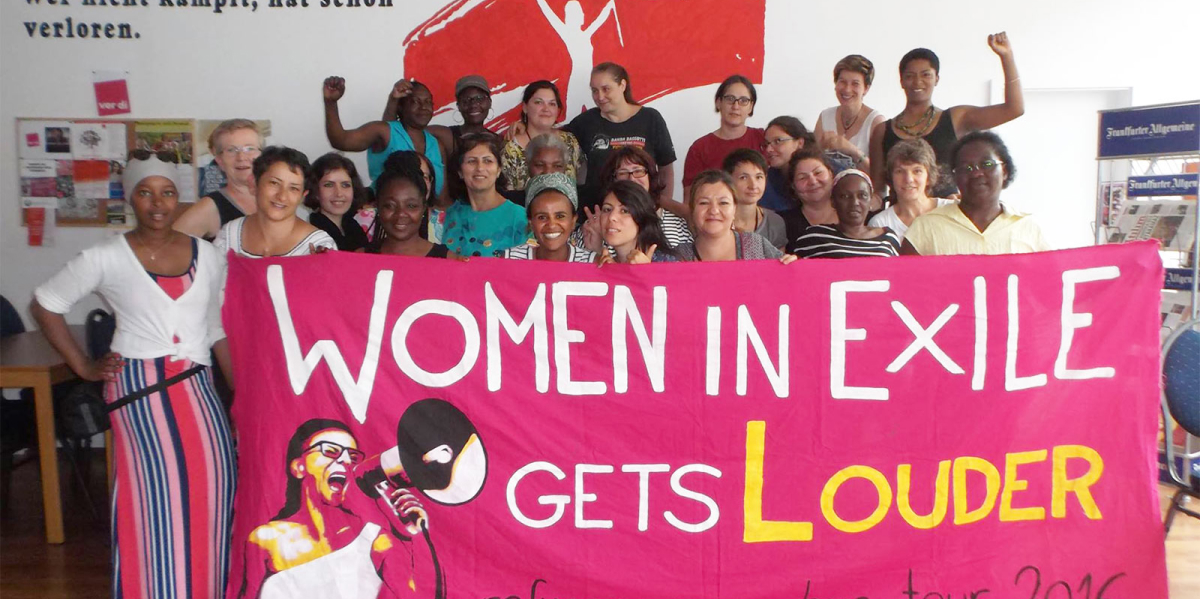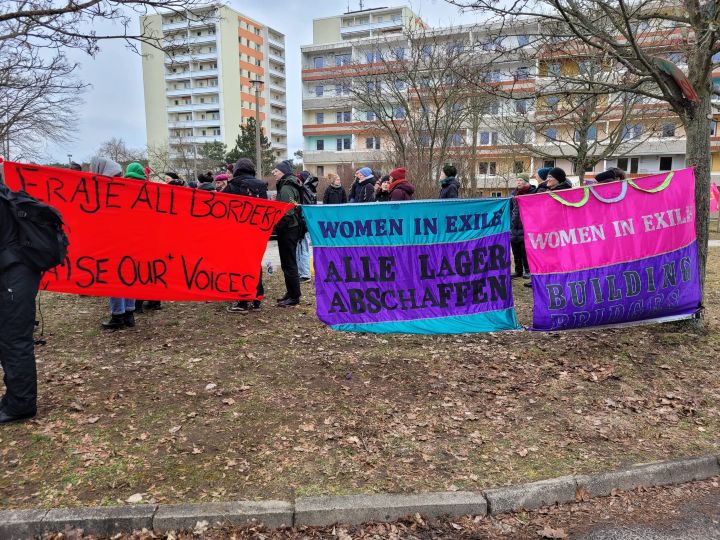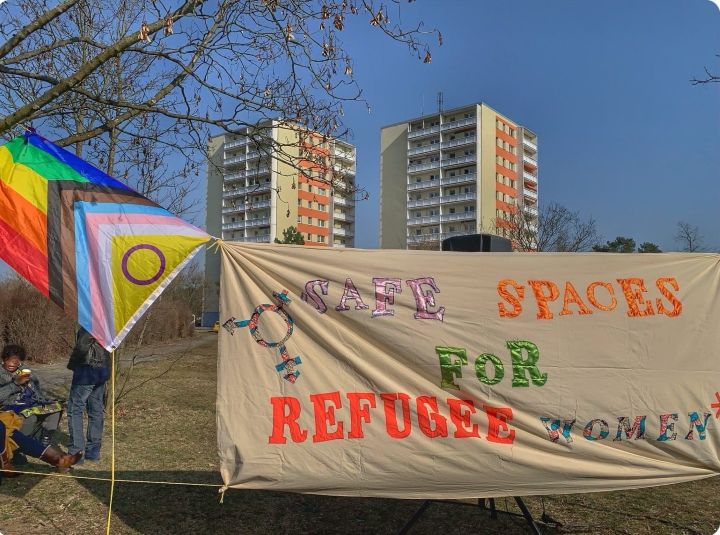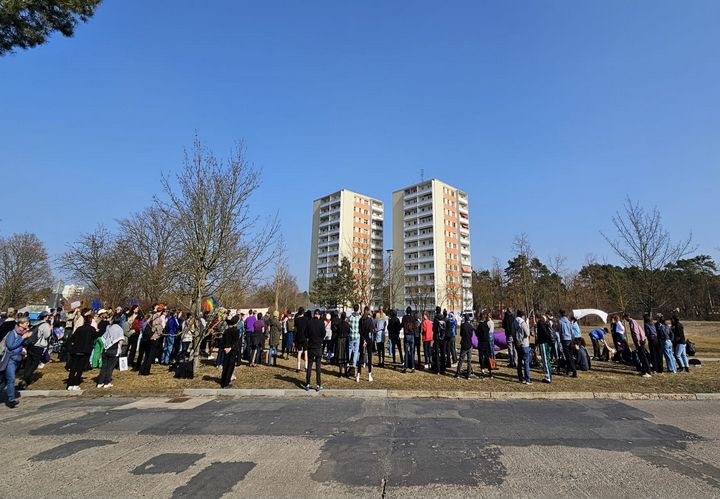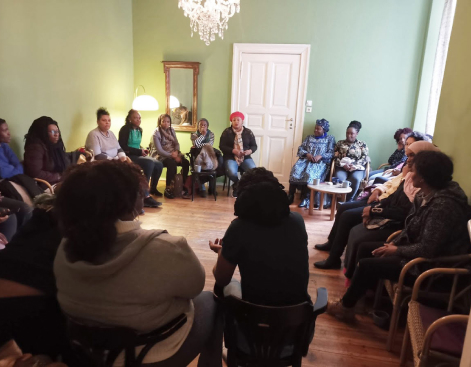On the occasion of our twentieth anniversary, we are organizing the International Women’s* Conference from August 4 to 7, 2022 in Berlin: Breaking Borders to Build Bridges. 20 Years of Women in Exile & Friends. We will make the international feminist struggles visible, analyse them and develop further the practices in exchange. We will pay special attention to the situation of refugee women*. We start from our individual and collective experiences, from our spaces of resistance and support. This resistance is crucial for surviving and overcoming racist, sexist and exclusionary practices, because before, during, and after fleeing our communities and regions, we face massive discriminations.
We call on refugee women*, feminists, and friends in solidarity to weave together experiences by sharing our analyses and practices of the economic, political, cultural, and social causes of displacement in different parts of the world today.
During these four days, seven thematic spaces will be open where we will host various participatory workshops, experience-sharing sessions, collective readings, audiovisual screenings, and cultural and artistic exhibitions. Each day will conclude with a gathering to collect the main reflections of the day.
Thematic spaces
1. Gender Causes of Flight: Exploitation, Exclusion and Violence
2. Climate Change and Disputed Territories: Political, Environmental, Economic, and Cultural Causes of Displacement and Forced Relocation
3. Solidarity and Practice: What is Solidarity and How is it Lived in Everyday Life?
4. Structural and Personal Racism: Effects of State Refugee Policies on Refugee Women* and Resistance to them
5. Health and spaces of healing. Health care for all – without racism
6. Women* Movements and Feminisms from the Global South
7. Reading of the collectively written book “Women in Exile – Breaking Borders to Build Bridges” and Conversations about Archiving
What we will talk about in the thematic rooms
Room 01: Gender-specific Causes of Flight: Exploitation, Exclusion and Violence
The workshops focus on gender-specific causes of flight such as sexualized violence on the run and in exile. In the global south, there are different forms of violence against women*. Mostly the violence is linked to poverty. Some are abused by their husbands; others are rejected by their families because of their gender orientation. Some of us have survived sexualized violence in our home countries. Others of us have survived gender-based violence while fleeing. If the countries where we seek asylum do not recognize gender-based persecution and sexualized violence as reasons for flight, we will continue to be at the mercy of patriarchal violence. In prisons, in refugee camps, in community shelters, in illegality, we resist state patriarchal violence. The speakers will also talk about healing from trauma – trauma caused by long, dangerous journeys and life in exile. And we will share our different sources of strength and strategies for organizing and protecting ourselves, sometimes collectively, sometimes alone.
Room 02: Climate Change and Disputed Territories: Political, Environmental, Economic, and Cultural Reasons for Displacement and Forced Resettlement
Climate catastrophe demands global change. Climate disruption in the Global South is a catalyst for migration and flight. Capitalist destruction and alteration of ecosystems, labour, and resource extraction are factors contributing to climate change and damaging people’s lives. The colonial past of land ownership, land grabbing, and multinational corporations leasing large tracts of land at very low cost are catalysts for droughts and consequent poor harvests, hunger, and the exodus of local communities. Youth are moving to the cities where they have no jobs and no way to make a living. As a result, they risk their lives and migrate to the Global North in search of opportunities to improve their lives. Too many of these people, especially those who want to get to Europe, die in the Sahara desert or the Mediterranean Sea, the world’s deadliest border.
In this workshop, our guests will talk about the challenges of climate change in their regions, especially how it affects women* in in their communities. We will talk about how people in the global North and South can work together to fight for climate justice. How resources can be shared in a way that benefits everyone, without one part just taking and the other being exploited. We want to learn from each other and find ways in solidarity to preserve the whole planet and not just a part of it.
Room 03: Solidarity and practice
We will ask a variety of questions about solidarity, collect ideas together, discuss concrete practices and look for answers to critical questions. What does solidarity mean? How is it lived in everyday life and in concrete actions? What kind of solidarity do refugee women* demand? What experiences do they* have with solidarity? How is solidarity practiced in other regions and continents? Is solidarity always “real”? Can it also be part of racist domination? How can paternalistic practices such as paternalism and domination be recognized in collective and activist spaces? How does paternalism devalue knowledge, cultural and social practices that differ from western rationalism? How can we use our different positions for political change? Can women of different status and access to resources meet as equals? How can hierarchies be dismantled? Together we want to develop proposals that can be practiced in activism and everyday interaction. In this way we strengthen ourselves and our networks.
Room 04: Structural and Personal Racism. Effects of State Refugee Policies on Refugee Women* and Resistance against Them
What impact do restrictive refugee policies have on the lives and bodies of refugee women*? We will discuss the racist practices that refugee women* and migrant women face on a daily basis. It is important for us to link the exchange and discussion about racist experiences with practice-oriented empowering approaches that strengthen us in the fight against racism.
First of all we want to show what it means not to be able to work or study, not to be allowed to move freely and also not to have access to the health system. Refugee women* are housed in camps outside of cities and villages. They live in isolation and face multiple forms of violence and discrimination. Women in Exile & Friends has been working on this for over 20 years and encourages women* to highlight their problems. Because this is a basis to further develop the analysis. There is a social and physical cartography that assigns us the isolated residence and a status without rights. Restrictions are linked to gender, sexual identification and orientation, place of origin, social class, religion or spirituality. We often face multiple discriminations. Trans people experience racism intertwined with trans hostility and sexism. Others experience racism interwoven with lesbophobia and ageism. Here we name only some of the forms of discrimination as examples.
In the practical part we would like to develop concrete possibilities of action that can be useful in everyday situations: What can a person do to resist racism? The participants of the practical workshops will discuss racist structures and focus on concrete everyday situations. What are the possibilities of reaction and action in case of discriminatory comments, attitudes, even physical assaults? What strategies to resist, to set limits, to stop racism and forms of discrimination interwoven with it have other participants developed? Were there allies and accomplices in such situations? What role do white women* supporters play? What role should they* play?
Room 05: Health and spaces of healing. Health care for all – without racism
Refugee women* are discriminated in health-system. They have little or no access to psychotherapeutic and medical care. The uncertain residence status is psychologically extremely stressful. Some of us become suicidal. Those who are illegalised are structurally completely left out, there is no right to treatment. In addition, there is racism in the health system. We ask ourselves: Why do so many refugee women give birth (often against their will) by caesarean section? Women in Exile knows the experiences of refugee women* very well, the activists have experienced it themselves.
In this thematic space we will point out the deficiencies. The aim is to find alternatives that restore our dignity. We invite participants to share experiences from the women’s movement and feminist networks. We will also share knowledge about traditional healing methods and find ways to strengthen the emotional and physical health of women and their communities. Support structures for refugees in Berlin, such as the Medi-Büro, will also present their work. The aim is to exchange different approaches, to be inspired by each other, to link different actors in order to strengthen health care for refugee women* and to put it on a broader basis.
Room 06: Women* Movements and Feminisms from the Global South
This space will bring together women* and feminists from Alkebulan (Africa) and Abya Yala (Americas) who will share their proposals for activism and anti-patriarchal, anti-racist and anti-capitalist feminism from the plurality of knowledge. We will learn about feminist perspectives, different visions of the world and how they deal with other knowledge that did not originate in the rationality of the West. The space invites women from different contexts to share their practice in fighting violence and racism and protecting their territory.
Room 07: Reading of the Collectively Written Book “Women in Exile – Breaking Borders to Build Bridges” and Conversation about Archiving
Collective Reading: “Women in Exile – Breaking Borders to Build Bridges.” In this space, the authors will read excerpts from the book. They will also share their motivations that led them to write and publish about their experiences in the Women in Exile & Friends collective. To this end, it is about celebrating the bridges of solidarity that have been built through this collective work in search of personal and collective healing.
Archiving: the process of creating the Women in Exile archive is presented here. The archiving was done by the activists themselves. Through participatory methods, processes of collection, classification, and recontextualization of documents created by the organisation over the past 20 years were facilitated.
